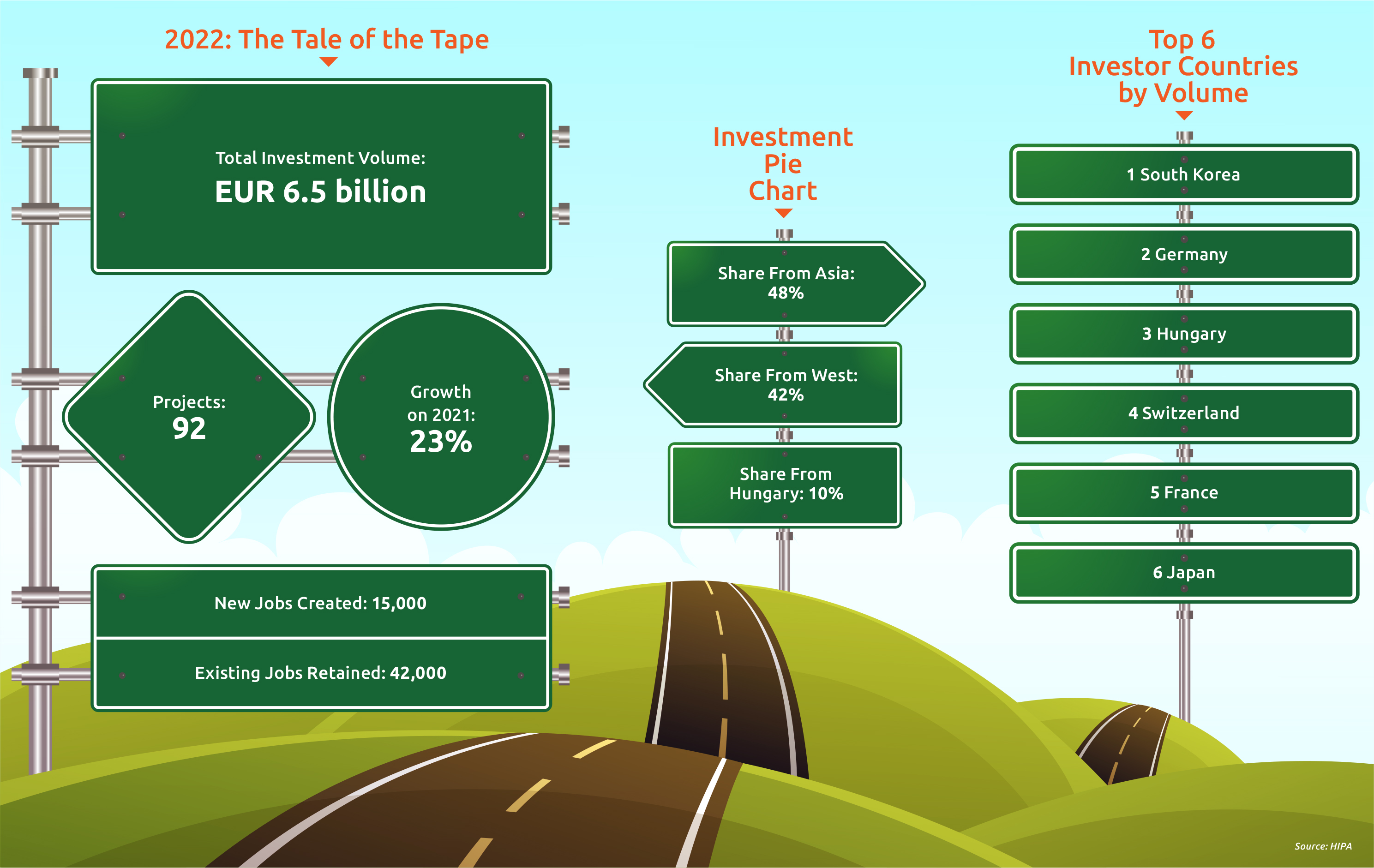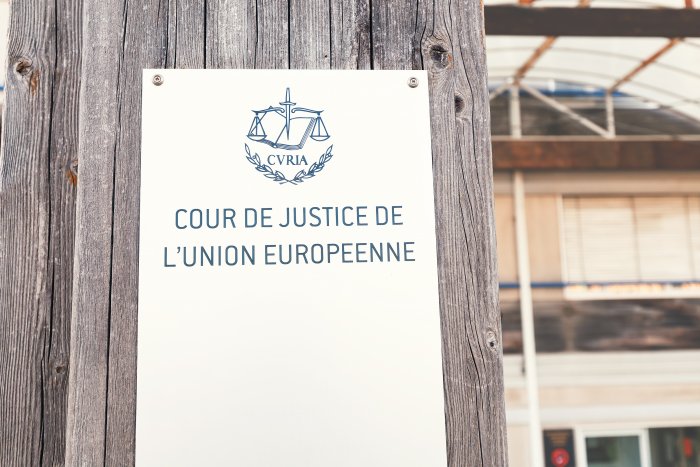Record Investments Booked for 2022, With Chance to Beat it in 2023

István Joó, CEO of HIPA.
Six months into his tenure as CEO of the Hungarian Investment Promotion Agency, the Budapest Business Journal had its first sit-down interview with István Joó. We discussed the specifics of another record-breaking year in 2022, the critical industries and countries for FDI, the strength of Hungarian investments, and the project pipeline for 2023.
BBJ: In most years, HIPA either breaks its record for investments in terms of value or is very close to it. What was the story in 2022?
István Joó: It was a successful year for HIPA because we reached new records in 2022. The investment volume amounted to EUR 6.5 billion, a new all-time high in the history of Hungarian investment promotion. And with those investments, the companies committed themselves to creating 15,000 new jobs on top of retaining 42,000. As a reminder, in 2021, the investment value was EUR 5.3 bln. So we are talking about a year-on-year increase of some 23%. We were able to close 92 deals in 2022.
BBJ: Are those 92 projects both investment and reinvestment?
IJ: It was both, and HIPA contributed mainly with non-refundable cash. We have a wide range of services we can offer to companies; identifying the necessary land, potential sites for the investment, and handling all kinds of company issues: HR-related, taxation, cooperation with universities and higher education. We have a bunch of services that we can offer to companies.
BBJ: Which countries were the leading foreign investors?
IJ: First of all, I’d like to mention the success of the “Opening to the East” strategy of the government, which was launched back in 2012. In 2022, 48% of our investments came from Eastern countries, 42% came from the West, and Hungarian companies made 10%. HIPA deals not only with foreign investors but also helps the expansion of Hungarian companies in the country.
Our largest investor, based on volume, was South Korea. Germany was the second, and Hungary third. And this was followed by Switzerland, France and Japan. I’d also like to mention China here because it is a vital partner for Hungary. Last year, we announced the most significant greenfield investment in Hungary’s economic history, CATL’s more than EUR 7.3 bln investment in Debrecen [230 km east of Budapest by road]. But, since physical works are just about to start in the first or second quarter, this number will be reflected in the 2023 data.
Germany is always a key investor in Hungary. Mercedes-Benz announced an expansion in Kecskemét [93 km southeast of the capital], Audi has announced some developments in Győr [119 km northwest], and BMW decided to further expand its Debrecen factory, which is now under construction. This is encouraging news from Germany, let me name Thyssenkrupp, Kostal, Diehl, Bürkle, and Infineon, which are important partners for Hungary.
Hungarian companies were successful not just because they implemented the third-biggest investment volume in the country in 2022. They were also third based on the number of new jobs created and second in terms of the number of new projects.
BBJ: Is that a relatively new trend, the level of input from Hungarian companies?
IJ: Based on investment volume data from the previous nine years, Hungary ranked between seven and two, and typically made at least the top five over the last few years. One should not forget that HIPA deals not just with foreigners but also with Hungarians. Sometimes I need to draw the attention of Hungarian companies to the fact that they are also entitled to our services.

BBJ Automotive, especially EVs, and business services have long been dominant. Is this still the case? Are there new areas emerging?
IJ: The picture doesn’t differ from previous years because most investments took place in the electronics sector, especially battery production-related projects. That was followed by the automotive and food industries. These were the top three categories, but pharmaceutical and logistics-related investments are also substantial. And the business services sector and BSCs continue to thrive. More than 70,000 people are employed at such centers, and in 2022, nearly 2,500 new jobs were created for highly skilled workers in the country, taking into account all the BSC, ICT and R&D projects.
BBJ: Are any areas beginning to bubble up that look interesting for the future?
IJ: Well, generally speaking, we were happy to see the increasing number of R&D-related projects in the automotive industry, in healthcare, and also in the food industry. That is very promising because we aim to attract high value-added investment to the country. Before 2019, our top priority was job creation quantity. Now we have shifted towards quality. Jobs with high added value are crucial for the success of the country. And R&D-related activities are booming.
BBJ: When we talk to businesses, the concern we hear a lot is finding available appropriate workforce. Hungary has the good challenge of having near full employment. In terms of finding reserves of labor, how does that challenge develop?
IJ: As you mentioned, it is a positive challenge for the country. It is true that the labor market is very tight. In November last year, the unemployment rate was 3.8%, which is very low compared to other EU member states. But we shouldn’t forget that the unemployment rate is still higher in some regions of the country. Especially in the northern and southern areas of Hungary, we still have relatively significant reserves from which companies can benefit. Moreover, to inspire our youngsters to participate in the labor market, we exempted them from paying personal income tax from January 1 last year, which seems to have been a very successful step by the government.
In 2021, we eased the participation of third-country workers in our labor market. We have a list of 15 countries from where registered recruiting companies are able to bring the necessary labor force on a fast track. Our primary objective is to help Hungarian people to have a livelihood in the country. But still, third-country workers are an option for companies. The government also launched a new program last year when the war broke out to help Ukrainian refugees who would like to work in Hungary find a job. We support companies with a cash subsidy if they hire a Ukrainian refugee. And so, this is another alternative.
BBJ: Talking of Ukraine, have you seen investors pulling out or expressing concern about investing in Hungary because of the war next door?
IJ: Foreign investors’ trust in the country and the Hungarian economy seems to be unbroken. That’s why we were able to reach another investment record in 2022. I believe they really value, first of all, the political stability in the country. Also, the lowest tax rates in Europe. We have one of the most competitive investment environments in Hungary, which is very important from the investors’ point of view. We don’t feel any adverse effects so far. And the government does everything in its power to counter the negative effects of the economic impact of the war. Our main purpose is to avoid recession and to be a local exemption from the European recession. For this, successful investments are critical. That’s why HIPA is boosting its activities. We have the necessary financial resources to provide cash subsidies for foreign investors, for new investments or reinvestments.
Certainly, all kinds of companies, from small to large, face challenges in terms of energy prices. That’s why the Hungarian government decided to launch the so-called Factory Rescue program to subsidize the energy efficiency and energy generation-related investments of large companies. We have further launched a program for small- and medium-sized enterprises to support their operational costs. We have also reviewed a state subsidy scheme under which companies are currently able to apply for funding when building a new factory, and up to 25% of the renewable energy-related costs are eligible. We would like to push this number up, hopefully from February.
BBJ: What are your expectations for 2023? Does the project pipeline look good? Do you think you will be able to better the 2022 record, or at least get close to it?
IJ: I am confident we can make it happen, considering that the CATL investment is reflected in 2023’s numbers; in addition, the project pipeline is very promising. I am optimistic that, in the coming months, we will be able to announce some significant investments again. Our priority is to attract high added-value investments into the country. We welcome investors regardless of their origin, whether from East or West.
BBJ: Is there anything else to add?
IJ: Last year, 90% of the projects targeted the countryside and 10% Budapest, which shows our commitment to the countryside and its economic development.
BBJ: And it helps with the tight labor market if you can convince investors that they should go to the south or the north.
IJ: Yes, but, of course, competition is fierce in the region too, and it takes a lot of effort to secure each and every investment project.
BBJ: Finally, it’s six months since you moved into the CEO’s role. How’s that been?
IJ: I’m thrilled to lead an organization of such strategic importance because the objective is clear for me and the whole agency, and our activities are vital for the success of the economy. Nowadays, Europe is facing economic challenges. So, our task is critical. At HIPA, we have highly skilled people with significant experience in investment promotion; we have the full support of the government, the foreign ministry, and Minister [Péter] Szijjártó. We have a clear mandate to help Hungary thrive; we have to be the best investment promotion agency in the region.
This article was first published in the Budapest Business Journal print issue of January 27, 2023.
SUPPORT THE BUDAPEST BUSINESS JOURNAL
Producing journalism that is worthy of the name is a costly business. For 27 years, the publishers, editors and reporters of the Budapest Business Journal have striven to bring you business news that works, information that you can trust, that is factual, accurate and presented without fear or favor.
Newspaper organizations across the globe have struggled to find a business model that allows them to continue to excel, without compromising their ability to perform. Most recently, some have experimented with the idea of involving their most important stakeholders, their readers.
We would like to offer that same opportunity to our readers. We would like to invite you to help us deliver the quality business journalism you require. Hit our Support the BBJ button and you can choose the how much and how often you send us your contributions.








